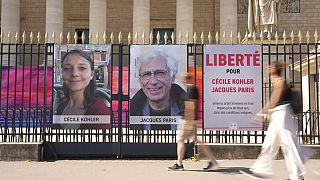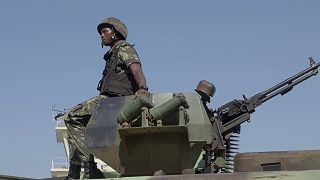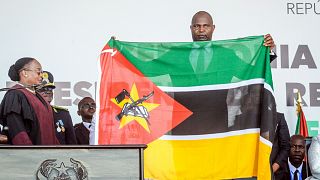Mozambique
The villages and towns devastated by the rebels in the districts of Quissanga and Macomia bear scars of terror on every corner and reconstruction is repeated amidst the ruins, but the trauma is great and fear persists among the communities.
"They took all this [the village] and destroyed all the properties that were here, including the houses and schools," he tells Lusa Samuel Saíde, a few meters from the ruins of his old house that succumbed to the barbarity of the group that attacked. The rebels attacked the village of Outubro, in the district of Quissanga, in the province of Cabo Delgado, more than a year ago.
The rebels attacked the village of Samuel Saíde, 56, in February 2020, a few days after a massive flight of this rural population, who already knew that the insurgents were terrorizing the neighboring regions.
In addition to killing an unknown number of people, the rebels looted property and burned houses (mostly made of adobe) in this forgotten community in the middle of nowhere, just a few meters from the bridge that separates Quissanga from Macomia, two of the nine districts affected by armed violence in Cabo Delgado over the past four years.
The day before the attack, Samuel Saíde fled to relatives who live in the nearby district of Macomia, a few kilometers from village 19 de Outubro, and did not return until four days later, after he was sure the rebels had abandoned the town, village, but his house had been burned down and his belongings looted.
"There was a lot of work [to build the house], I hit the machamba [garden] to get money. When I got here [after the escape] and I didn't catch anything, I was very angry," said Samuel Saíde.
Even "furious" and without the means of survival of his eight children, given that he was forced to leave his garden due to insecurity, Saíde wants to restart life in his village, and is already personally building his new house in front of it at the ruins of the ancient.
Although Saíde's will is strong, the fear of new attacks persists among the more than 300 people who live in the community, despite several military positions stationed along the road that crosses the heart of the small village (EN380), one of the main ones in the village north of Cabo Delgado.
Artisan Yassin Swahili is another of the many residents of the community who decided to return home after more than a year in a refuge in Metoro, one of the areas in a nearby neighborhood that hosts dozens of people who fled armed attacks at various points. .of Quissanga.
"They burned everything and I found nothing when I came back," Swahili lamented.
Yassin Swahili's situation is more complicated on rainy days, as his 19 family members sleep in one room in the part of his house that escaped the insurgents.
"We sleep here. Now I am trying to build a new house, but I have nothing," he said.
The suffering caused by the armed insurgency in Cabo Delgado for Yassin Swahili will forever be etched in his memory: his 18-year-old son died in one of the refugee camps in Metoro from a sudden illness.
"I feel bad," laments the artisan, sitting in the ruins of his former home as he produces one of the baskets he sells to support his family, who have now returned to their home neighborhood and, even visibly traumatized, hope that tranquility will reign. .
The chief of the village of October 19, Bento Abel, assures Lusa that the area is calm, thanks to the work of government forces, now supported by soldiers from Rwanda and the Southern African Development Community.
"We want peace so we can start producing again. We are still producing, from rice, maize and cassava, and now we are suffering," adds Abel.
Not far from the village of Outubro, the capital of the district of Macomia is also recovering: there have been no more attacks recorded for several months and people are gradually returning to their areas of origin.
"Many are returning to their homes," said Lusa Celestino Ossufo, a resident of the main village in Macomia District who preferred to stay in his neighborhood, even when insurgents invaded several months ago.
In Macomia, the wake of destruction is also deep: the rebels destroyed government infrastructure, ransacked the local hospital, and burned down several houses and police stations.
"We found our houses all destroyed. We don't know what they wanted or what they want," said Celestino Ossufo.
After Mocímboa da Praia, Muidumbe, and Palma, the districts of Quissanga and Macomia are among those most affected by the actions of armed groups in Cabo Delgado. The incursions there have already left more than 3,100 people dead, according to ACLED's Conflict Registration Project, and more than 817,000 displaced, according to the Mozambican authorities.
The fight against insurgents in Cabo Delgado gained momentum when, on August 8, joint forces from Mozambique and Rwanda recaptured the strategic port city of Mocímboa da praia













01:13
17 soldiers killed as gunmen raid army bases in northern Nigeria
01:03
Kenyan court finds two men guilty of facilitating 2019 hotel terrorist attack
Go to video
France: Family of mosque murder victim want case treated as terrorism
00:58
U.S. airstrikes kill 20 at Yemen oil port held by Houthis
Go to video
At least 300 people killed during the post-election violence in Mozambique
Go to video
Scores killed in attack by gunmen in central Nigeria